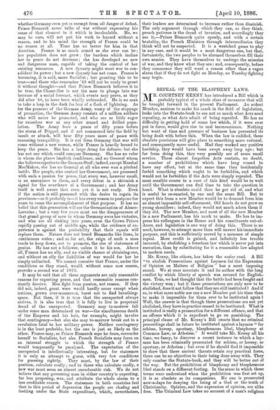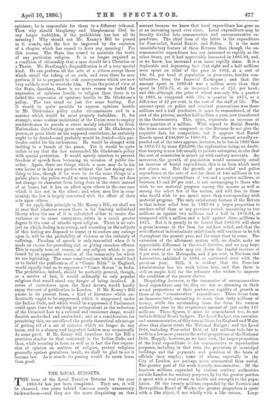REPEAL OF THE BLASPHEMY LAWS.
mit. COURTNEY KENNY has introduced a Bill which-is probably typical of a whole class of measures that will be brought forward in the present Parliament. An ardent Member, anxious to make his mark in the field of legislation, looks into the Statute-book to see not so much what Acts need repealing, as what Acts admit of being repealed. He has no difficulty in getting hold of some law which, if it were ever put in force, would give rise to real inconvenience. Nothing but want of time and pressure of business has prevented its being dealt with before this. When the law is codified, these obsolete provisions will give place to something more rational, and consequently more useful. Had they worked any positive hardship, they would have been swept away long ago ; but far from doing this, they very possibly are of some small service. These almost forgotten Acts contain, no doubt, a number of prohibitions which have long ceased to have any effect, but at the same time they incidentally forbid something which ought to be forbidden, and which would not be forbidden if the Acts were simply repealed. The most sensible course in a case of this kind would be to wait until the Government can find time to take the question in hand. What is obsolete could then be got rid of, and what is useful be re-enacted, by one and the same Bill. But to expect this from a new Member would be to demand from him an almost impossible self-effacement. Old heads do not grow on young shoulders ; indeed, they would not much adorn them if they did. The new Member, and most of all the new Member in a new Parliament, has his mark to make. He has to im- press his colleagues in the House and his constituents out-of- doors, and legislation is one way of doing this. There is no need, however, to attempt more than will answer his immediate purpose, and this is sufficiently served by a measure of simple repeal. More credit is gained, and infinitely less trouble incurred, by abolishing a ferocious law which is never put into execution, than by substituting for it a reasonable law adapted to modern needs.
Mr. Kenny, like others, has taken the easier road. A Bill "to abolish Prosecutions against Laymen for the Expression of Opinion on Matters of Religion" has a most imposing sound. We at once associate it and its author with the long conflict by which liberty of speech was secured for English- men. True, we had thought that the battle had been fought and the victory won ; but if these prosecutions are only now to be abolished, does it not follow that they are still instituted? And if so, to what more noble use can a new Member put his time than to make it impossible for them ever to be instituted again Well, the answer is that though these prosecutions are not yet abolished, they have in practice ceased to be instituted. What is instituted is really a prosecution for a different offence, and that an offence which it is expedient to go on punishing. The principal clause of Mr. Kenny's Bill enacts that no criminal proceedings shall in future be instituted against a layman "for schism, heresy, apostasy, blasphemous libel, blasphemy at Common Law, or Atheism." It would take Mr. Kenny all his time, we fancy, to discover a recent instance in which a lay- man has been criminally prosecuted for schism, or heresy, or apostasy, or Atheism ; but even if he should find it impossible to show that these ancient threats retain any practical force, there can be no objection to their being done away with. They only cumber the Statute-book, and they will be better out of the way. But the prohibition of blasphemy and blasphemous libel stands on a different footing. In the sense in which these terms were understood when the prohibition was first set up, it is as obsolete as its companions. No one is prosecuted now-a-days for denying the being of a God or the truth of Christianity. Opinion, and the expression of opinion, are alike free. The Criminal Law takes no account of a man's religious
opinions ; he is responsible for them to a different tribunal. Then why should blasphemy and blasphemous libel be any longer forbidden, if the prohibition has lost all its meaning ? Why should not Mr. Kenny's Bill be passed as it stands, and the law be improved by the omission of a chapter which has ceased to have any meaning ? For this reason. The State has ceased to maintain the truth of any particular religion. It is no longer required as a condition of citizenship that a man should be a Christian or a Theist. Mr. Bradlaugh's disqualification is of a very special kind. He can perform all the acts of a citizen except those which entail the taking of an oath, and even these he may perform if he is prepared to risk consequences which are now very unlikely ever to overtake him. From the point of view of the State, therefore, there is no more reason to forbid the expression of opinions hostile to religion than there is to forbid the expression of opinions hostile to Mr. Gladstone's policy. The two stand on just the same footing. But it would be quite possible to express opinions hostile to Mr. Gladstone's policy under circumstances and in a manner which would be most properly forbidden. If, for example, some zealous maintainer of the Union were to employ sandwich-men to parade a street mainly inhabited by Irish Nationalists, distributing gross caricatures of Mr. Gladstone's person, or gross libels on his supposed convictions, he certainly ought to be denied—and probably would be denied—this par- ticular outlet for his enthusiasm. He would be charged with inciting to a breach of the peace. Yet it would be quite unfair to say that the law surrounded Mr. Gladstone's policy with special protection. It would merely interfere to prevent freedom of speech from becoming an occasion of public dis- order. Again, there are things which a man may do in his own house or in his own garden without the law saying any- thing to him, though if he were to do the same things in a public place, the police would at once interpose. The act does not change its character from being done in the street instead of at home, but it has an effect upon others in the one case which it has not in the other ; and when men live in com- munity, the law is largely concerned with the effect of their acts upon others.
If we apply this principle to Mr. Kenny's Bill, we shall see at once that whatever reason there is for limiting individual liberty when the use of it is calculated either to create dis- turbance or to cause annoyance, exists in a much greater degree in the case of attacks upon religion. There is no sub- ject on which feeling is so strong, and according as the subjects of this feeling are disposed to resent or to endure any outrage upon it, will be the probability of violence or the certainty of suffering. Freedom of speech is only travestied when it is made an excuse for provoking riot or giving causeless offence. This is equally true, of course, of any religion which is pro- fessed by an appreciable section of the community for which we are legislating. The same considerations which would lead us to forbid the publication of a "Cornic Bible" in England, would equally lead us to suppress a "Comic Koran" in India. The prohibition, indeed, should be perfectly general, though, as a matter of fact, it would ordinarily be only popular religions that would stand any danger of being insulted. A series of caricatures upon the Zend Avesta would hardly repay the cost of publication in London. If Mr. Kenny's Bill passes in its present form, a kind of literature which un- doubtedly ought to be suppressed, which is suppressed under the Indian Code, and which would be suppressed if Parliament could spare time for anything so unimportant as the reduction of the Criminal Law to a rational and consistent shape, would flourish unchecked and unabashed ; and as a consideration for permitting this, we are offered the purely theoretical advantage of getting rid of a set of statutes which no longer do any harm, and in a clumsy and imperfect fashion may occasionally do some good. If Mr. Kenny will introduce into his Bill a provision similar to that contained in the Indian Code, and thus, while securing in form as well as in fact the free expres- sion of opinion on matters of religion, protect religions generally against gratuitous insult, we shall be glad to see it become law. As it stands, its passing would do more harm than good.



































 Previous page
Previous page